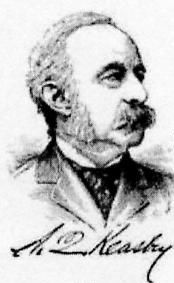|
Anthony Q. Keasbey
James Terry White, The National Cyclopaedia of American Biography "KEASBEY Anthony Q., lawyer, was born in Salem, N.J., March 1, 1824. His great-grandfather Edward Keasbey, was an active and prominent man in public affairs while New Jersey was still a colony, as well as after it became a state. In the colonial general assembly he represented the counties of Salem and Cumberland from 1763 to 1769, and was a deputy for Salem in the provincial congress which assembled at Trenton in 1775. Of the council of safety he was also a member in 1778. His son, Anthony Keasbey, was scarcely less prominent, filling among other public positions, that of a representative of Salem county in the general assembly of the state from 1798 to 1801. His father was Edward Q. Keasbey, a physician and surgeon eminent in his profession. He was appointed a judge of the court of common pleas of Salem county in 1840, and in 1844 he was chosen a presidential elector, and gave his vote for Henry Clay. The son, Anthony Q. Keasbey, was at an early age prepared to enter upon his collegiate studies. In 1843 he was graduated from Yale college, and soon after became a student at law in the office of Francis L. McCulloch in his native town. He finished his studies in Newark, N.J., and in October, 1846, having been admitted to the bar, he resumed his residence in Salem, where he entered upon the practice of his profession, and where he pursued it until 1852, when he removed to Newark. In 1855 he entered into partnership with Cortlaudt Parker, and that relation continued for more than twenty years. In April, 1861, he received from President Lincoln the appointment of U.S. attorney for the district of New Jersey, and in 1865 was reappointed. It was discovered, however, after the death of Mr. Lincoln, that the commission had not been signed, and Mr. Keasbey was thereupon appointed by President Johnson until the next session of the senate, when, in 1866, he was regularly commissioned for another term of four years. In 1870 he was reappoiuted by President Grant, and again in 1874. In 1879 the office was once more accorded to him for a term of four years. He thus held this important position continuously from the spring of 1861 to that of 1886, a period of unbroken incumbency longer than that of any other U.S. district attorney in the Union. . . . In 1876 the partnership which had so long existed between Mr. Keasbey and Mr. Parker was dissolved, and Mr. Keasbey associated with himself his two sons, Edward Q. and George, under the firm name of A.Q. Keasbey & Sons. Mr Keasbey is a man of literary attainments, as well as of professional learning, adding to distinguished legal abilities and acquirements the culture and taste of the scholar. He has made several valuable contributions to the pamphlet and periodical literature of the day, and without seeking reputation as a poet, has written and privately printed for the gratification of friends many very beautiful verses." [James Terry White, The National Cyclopaedia of American Biography 361 (J.T. White Co., 1893)(vol. 3)][Keasbey served as New Jersey U.S. Attorney from 1861 to 1886.[Office History]
Writings Anthony Q. Keasbey, From the Hudson to the St. Johns (Newark, New Jersey: Newark Daily Advertiser, 1874) Research Resources |
